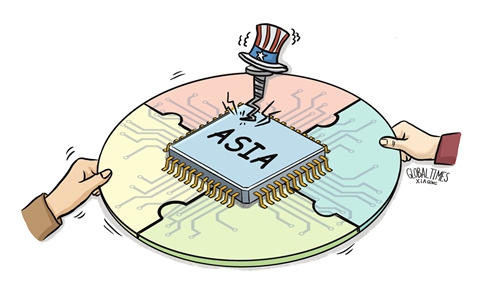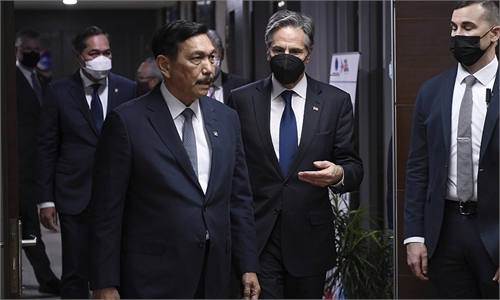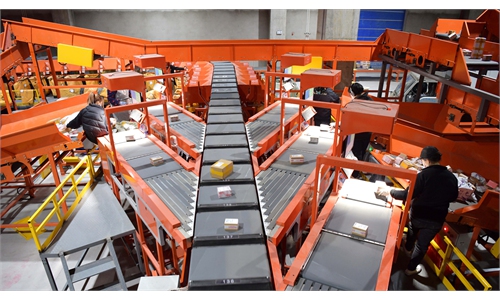COMMENTS / EXPERT ASSESSMENT
Indonesia ferronickel plant highlights closer supply chain integration in Asia

Illustration: Tang Tengfei/Global Times
Indonesian President Joko Widodo on Monday inaugurated a new ferronickel plant invested by a Chinese company in southeast Sulawesi province. In addition to creating local jobs, and boosting taxation and foreign exchange reserves, the $2.7 billion project will largely improve the resource-rich country's status in the global value chain.Indonesia is the world's most important nickel supplier. According to statistics, 22 to 24 percent of global nickel demand comes from Indonesia. In order to enhance the country's position in the value chain, in 2020, the Indonesian government banned the export of nickel ore and encouraged foreign companies to invest in local smelters. This was followed by Chinese company Jiangsu Delong Nickel Industry winning the project.
According to a statement from the Indonesian government, the plant is able to process 13 million tons of nickel ore annually. Nickel is a key raw material for stainless steel, batteries and electric vehicle (EV) manufacturing.
After starting production, the Indonesian nickel plant will undoubtedly provide strong support for the global industrial chain, especially the increasingly important EV industry.
Lingering supply chain disruption is continuing to impede the global economy. The global semiconductor chips supply crunch that has lasted for almost a year is causing more economic losses, from auto and home appliance industries to more sectors such as medical equipment. The global supply chain tumult is estimated to last through 2023, according to The Wall Street Journal.
Objectively speaking, the main cause of the current global supply chain crisis is the fallout of the COVID-19 pandemic, but it is clear that the protectionism and "decoupling" measures spearheaded by the US government and the small clique of its close allies cannot shirk the blame.
In order to restrict the development of China's high-tech industries, the US has relentlessly imposed restrictions on scores of Chinese companies under the disguise of protecting its "national security". In addition to prohibiting US tech companies from trading with Chinese companies, the US has used long-arm jurisdiction to arbitrarily interfere with foreign companies' normal business deals with China, severely disrupting the global supply chain.
Former US President Donald Trump's higher tariffs against China and other major economies is another culprit of the supply chain problems.
The Biden administration's recent moves to remove punitive tariffs on EU steel and aluminum were only political maneuver to win over its allies, rather than correction of his predecessor's flaws.
The US' tariffs imposed on hundreds of billions of dollars on Chinese goods remain harming the interests of American consumers and businesses, while exacerbating supply chain distortions. The global supply chain crisis has sounded the alarm for US "decoupling" and protectionism a long time ago, but Washington is determined to pursue the wrong path.
The US government recently halted American chip maker Intel's plan to build a plant to manufacture silicon wafers in Chengdu, Southwest China's Sichuan Province. While the US' so-called Xinjiang act is prompting anger and ire among Chinese consumers and companies, Intel's recent statement to "not source from Xinjiang region" caused severe damage to its brand image.
The deliberate campaign of the US to block cooperation between American technology companies and China are creating opportunities for companies in Asian countries. China's State Administration for Market Regulation (SAMR) last week approved South Korean chip firm SK Hynix Inc's $9 billion buyout deal with Intel following an antitrust review.
At present, economic globalization has penetrated into all fields of production, circulation, and consumption. Any attempt of "decoupling" from China is unrealistic and will inevitably be punished by the laws of economics.
Whether the US is willing to accept or not, the integration and upgrading of the Asian industrial chain is accelerating. With the RCEP, the world's largest free trade zone, coming into effect in early 2022, economic integration of the most dynamic region in the world will accelerate its pace. The US' petty actions to split and undermine regional cooperation are poised to fail.
It is hoped that the policymakers of the US and its allies can correct their mistakes, follow the trend of globalization, and work with other countries to take practical measures to solve global supply woes and promote the post-COVID recovery.
The author is a reporter with the Global Times.bizopinion@globaltimes.com.cn



